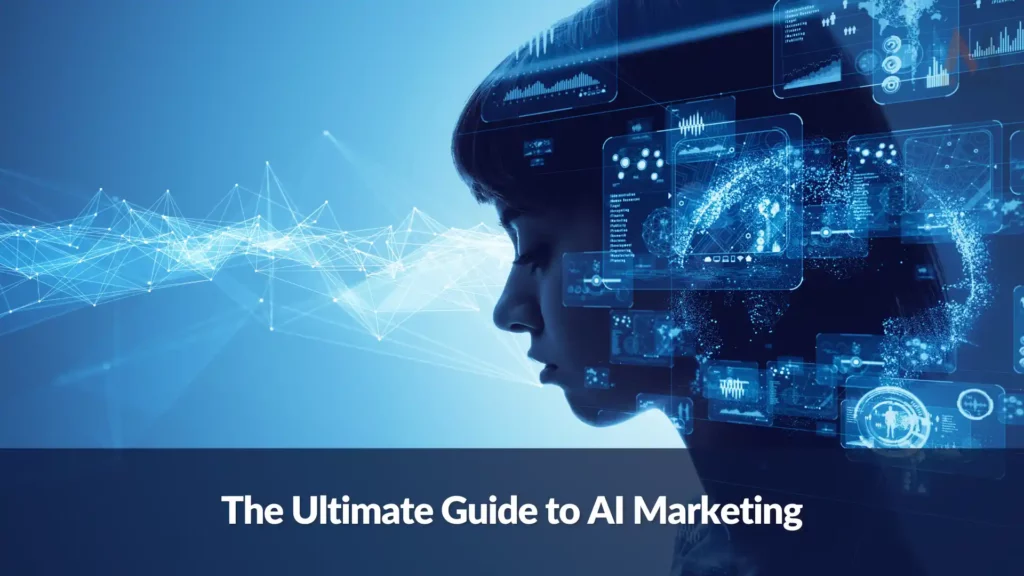The Ultimate Guide to AI Marketing
Get Your Copy Artificial Intelligence – AI Marketing Guide: Harnessing the Power of Artificial Intelligence in Marketing
Learn About How to Leverage Artificial Intelligence – Ultimate Guide to AI Marketing in 2026.
Artificial Intelligence (AI) has rapidly become integral to the marketing landscape.
By incorporating the best AI marketing tools and strategies, marketers can gain a deeper understanding of their customers, optimize their campaigns, and achieve better results. Without marketing AI tools, AI-driven marketing is impossible.
This guide provides an overview of AI marketing, including its benefits, examples of AI in marketing, AI marketing strategies, AI marketing platforms, and guidance on utilizing AI for marketing purposes.
What Is AI Marketing?

AI selling refers to the application of artificial intelligence (AI) technologies and techniques in marketing. It involves leveraging machine learning algorithms, data analysis, and automation to enhance and optimize marketing efforts.
- Customer segmentation: AI can analyze vast amounts of customer data, including demographics, purchase history, and online behavior, to identify and segment target audiences. This enables marketers to create personalized and relevant marketing campaigns that resonate with their audience and drive better results.
- Content generation: AI-powered tools can assist in generating engaging and relevant content, including copywriting, headlines, and social media posts. By analyzing past content performance and predicting what will resonate with the audience, these tools can help marketers create content that drives engagement and conversions.
- Campaign optimization: AI can analyze real-time campaign data and adjust to improve performance. For example, AI can optimize bidding strategies for digital advertising, ensuring ads are shown to the right people at the right time and adjusting targeting or creative elements based on performance.
- Predictive analytics: AI-driven analytics platforms can analyze historical and real-time data to identify trends, patterns, and customer preferences, allowing marketers to make informed decisions about campaign strategies, customer targeting, and resource allocation.
- Personalization: AI can help marketers deliver personalized customer experiences by analyzing individual preferences, behavior, and interactions. This enables marketers to tailor their messaging, offers, and content, increasing customer satisfaction and conversion rates.
- Marketing automation: AI can automate various marketing tasks, such as email marketing, social media posting, and customer communication, freeing marketers’ time to focus on more strategic and creative aspects of their campaigns.
- Sentiment analysis: AI can analyze customer feedback, social media posts, and online reviews to gauge public sentiment, helping marketers understand their audience’s emotions and opinions about their brand, products, or services. Agent as a Service: Faster, Cheaper, and Better Marketing
AI sales and marketing leverage the power of artificial intelligence to improve marketing strategies, drive personalization, and enhance customer experiences, ultimately leading to better marketing performance and increased business success.
Understand the Basics of AI Marketing.

AI selling uses machine learning algorithms and data analysis techniques to automate, optimize, and enhance marketing efforts. This includes customer segmentation, content creation, campaign optimization, and predictive analytics.
Marketing with AI refers to applying artificial intelligence (AI) technologies and techniques in marketing. You have to know how to use AI in marketing, and learning Artificial intelligence marketing technology from the marketing AI institute will help.
Google Ads Checklist – Download Now! 🚀
Struggling to get the most out of your Google Ads? 🔥 Download our Google Ads Optimization Checklist and take your campaigns to the next level!
✅ Maximize Clicks & Conversions
✅ Lower Your Cost-Per-Click (CPC)
✅ Improve Ad Quality Scores
✅ Target the Right Audience
This free checklist will help you set up, optimize, and scale your Google Ads campaigns for maximum ROI.
It involves leveraging machine learning algorithms, data analysis, and automation to enhance, optimize, and personalize marketing efforts.
Artificial intelligence enables marketers to gain a deeper understanding of their customers, tailor campaigns more effectively, and enhance overall marketing performance.
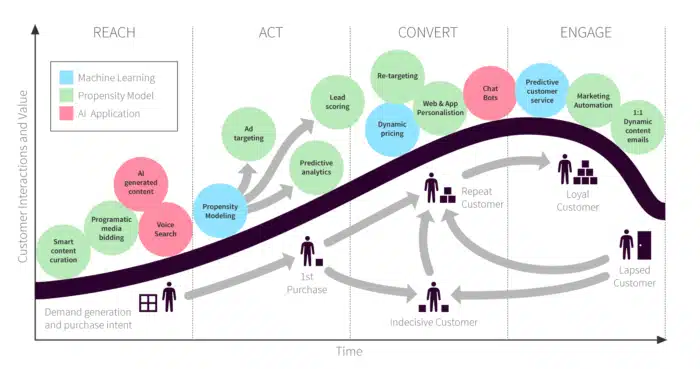
Introducing PrescientIQ
PrescientIQ is the AI-powered growth suite that gives marketing and sales leaders the clarity, speed, and scale they’ve never had before. By automating workflows and delivering predictive insights in a single, unified platform, PrescientIQ enables organizations to move beyond today’s constraints — unlocking smarter growth, faster decisions, and limitless scalability.
Artificial intelligence marketing leverages the power of artificial intelligence to improve marketing strategies, drive personalization, and enhance customer experiences, ultimately leading to better marketing performance and increased business success.
Identify key Artificial intelligence marketing tools and platforms.
Numerous AI-driven tools and platforms are available to marketers.
- Chatbots: AI-powered chatbots can handle customer service inquiries, guide users through the sales funnel, and provide personalized product recommendations.
- Content generation tools: These tools can help you create engaging copy, headlines, and social media posts by analyzing the performance of past content and predicting what will resonate with your audience.
- Predictive analytics platforms analyze historical and real-time data to identify trends, patterns, and customer preferences, enabling marketers to make informed decisions about campaign strategies and customer targeting. How to Choose the Right AI Digital Marketing Agency: A Comprehensive Guide for Marketing Managers
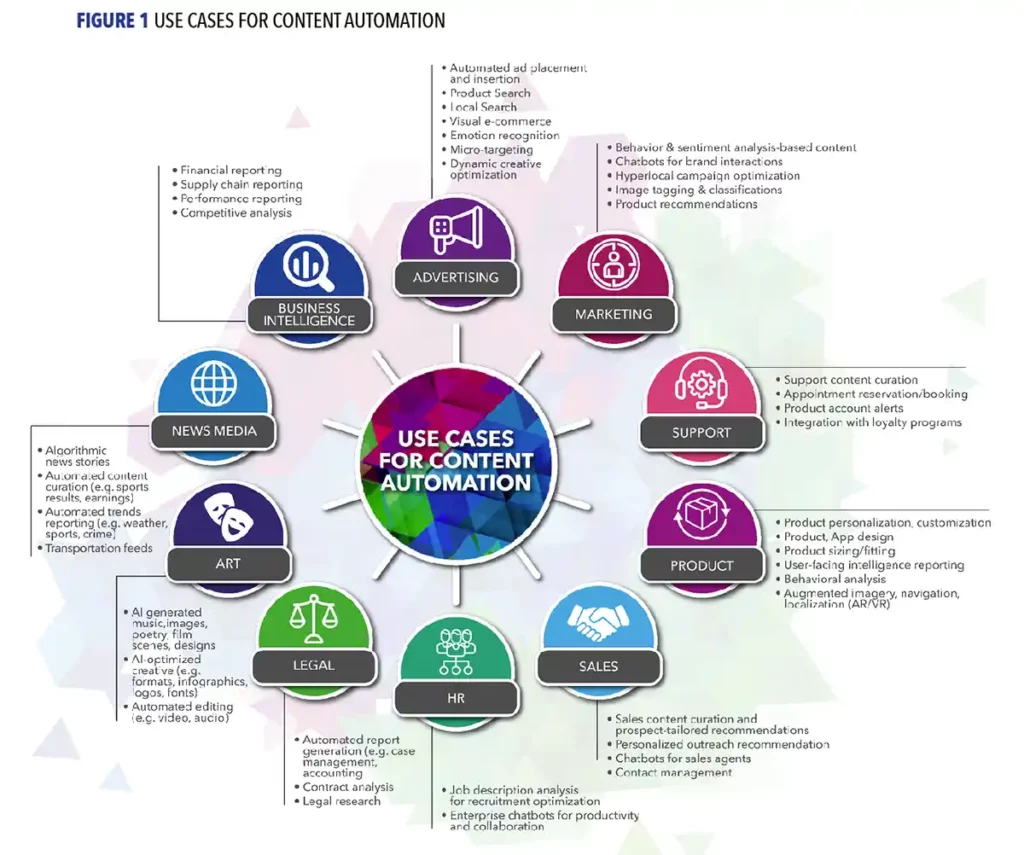
Numerous artificial intelligence marketing tools and platforms are available, catering to various aspects of marketing.
Here is a list of key AI tools and platforms:
- Chatbots and virtual assistants:
- IBM Watson Assistant: A chatbot platform that helps businesses build conversational interfaces for customer service, sales, and support.
- ManyChat: A chatbot platform for creating Facebook Messenger bots to automate customer communication.
- Content generation and curation:
- Phrasee: An AI-powered language optimization tool for generating high-performing email subject lines, ad copy, and social media captions.
- MarketMuse: A content optimization platform that uses AI to help marketers create high-quality, SEO-optimized content.
- ChatGTP (ChatGPT3.5 and ChatGTP4)
- Predictive analytics and insights:
- Google Analytics Intelligence: An AI-driven analytics tool that provides insights, trends, and predictions based on website traffic and user behavior.
- Adobe Analytics: A comprehensive analytics platform that leverages AI to provide advanced customer insights, segmentation, and predictive analytics.
- Advertising optimization:
- Albert: An AI-driven platform that optimizes digital advertising campaigns across channels, automating targeting, bidding, and creative elements.
- Acquisio: A platform that uses AI and machine learning to optimize and automate digital advertising campaigns on platforms like Google Ads and Facebook Ads.
- Personalization and recommendation engines:
- Dynamic Yield: A personalization platform that uses AI to deliver tailored experiences and product recommendations for e-commerce websites.
- Optimizely: A platform offering AI-driven website and app personalization, A/B testing, and optimization capabilities.
- Email marketing automation:
- Persado: An AI-powered platform that generates personalized email content to improve engagement and conversion rates.
- Seventh Sense: An AI-driven tool that optimizes email send times based on recipient engagement patterns.
- HubSpot is an all-in-one inbound marketing and sales platform that helps businesses attract visitors, convert leads, close customers, and delight promoters. With HubSpot, you can create content to attract visitors seeking your offer.
- Social media management:
- AISocialPad: An AI-powered platform that helps marketers create, analyze, and optimize social media content.
- Lately: A social media management tool that uses AI to generate, schedule, and analyze social media posts.
- SEO and keyword research:
- AISearchPad: An AI-driven platform that provides insights and recommendations to optimize website content for search engine rankings. Includes a content optimization tool that leverages AI to provide keyword recommendations and content analysis for better search engine visibility.
- Sentiment analysis and social listening:
- AIBrandPad and AISocialPad: A social listening and analytics platform that uses AI to analyze sentiment and monitor brand reputation online. A social media management tool incorporating AI-driven sentiment analysis to help marketers understand customer emotions and opinions.
These tools and platforms are just a sample of the numerous AI sales and marketing solutions available. By selecting the right combination of AI-powered sales and marketing tools, businesses can refine their marketing strategies and achieve better results.
Leverage AI to Improve Customer Segmentation.
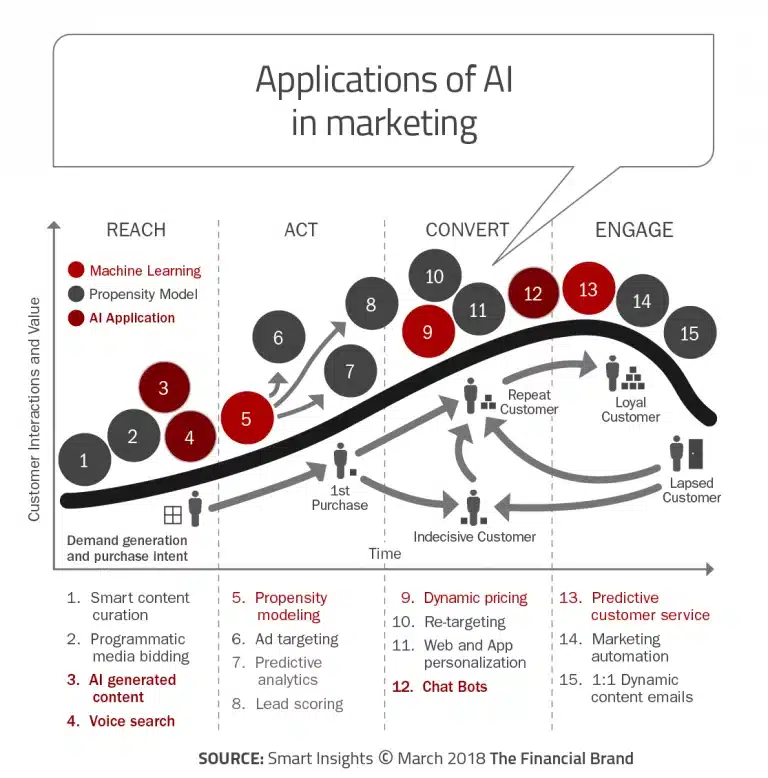
AI can help you identify and segment your target audience based on demographics, purchase history, and online behavior.
This enables you to create tailored marketing campaigns that resonate with your audience and drive better results.
Use AI to Optimize Marketing Campaigns.
AI-driven tools can analyze campaign data in real-time and make adjustments to enhance performance. For example, AI can optimize bidding strategies for digital advertising, ensuring that your ads are shown to the right people at the right time.
Enhance Content Creation with AI.
AI-powered content creation tools can help you generate engaging and personalized content by analyzing user data and preferences. This enables you to create content that resonates with your audience, increasing engagement and conversion rates.
Enhancing content creation with AI involves leveraging AI-driven tools and techniques to generate engaging, relevant, and personalized content that resonates with your audience.
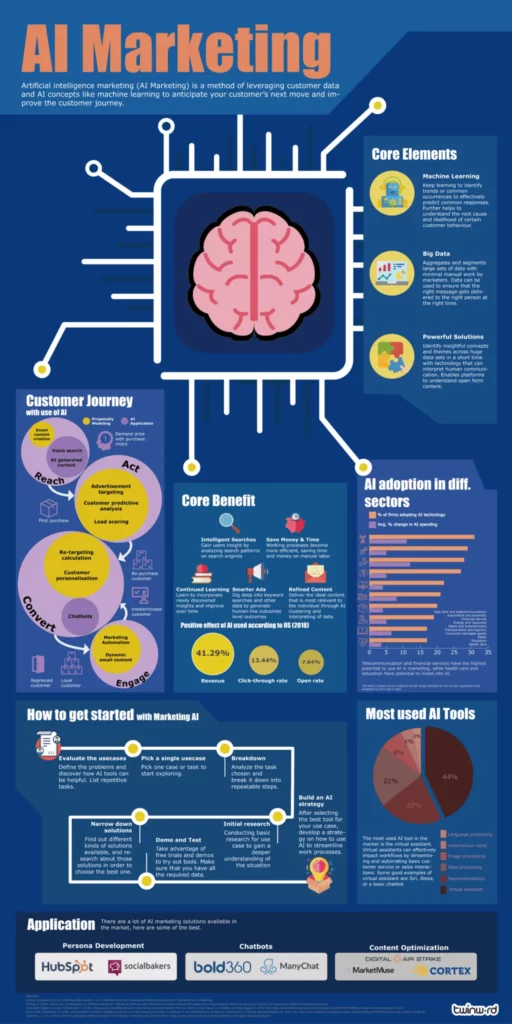
Here are some steps to enhance content creation with AI:
- Identify your content goals: Before using AI-driven tools, it’s essential to have a clear understanding of your content objectives. This could include increasing brand awareness, driving engagement, generating leads, or improving search engine rankings.
- Choose the right AI tools: Select AI-powered content creation tools that align with your content goals and needs. Some popular AI-driven content generation tools include Copy.ai, Jarvis.ai, and Phrasee.
- Analyze your audience: Use AI-driven analytics tools to gain insights into your target audience’s demographics, interests, preferences, and online behavior. This information will help you create content that appeals to and engages your audience.
- Optimize headlines and titles: Utilize AI-powered headline generation tools to craft attention-grabbing titles that encourage users to click and engage with your content. These tools analyze high-performing headlines and provide suggestions based on what will likely resonate with your audience.
- Improve content relevance and readability: AI-driven content optimization tools can analyze your content and provide suggestions to improve readability, keyword usage, and overall relevance. This helps ensure that your content is both engaging and optimized for SEO.
- Personalize content for different segments: Leverage AI-driven personalization tools to tailor content for different audience segments. By offering personalized content, you can enhance user engagement, improve the overall user experience, and increase conversions.
- Automate content distribution: AI-driven content distribution tools can help you automatically publish and share content across different channels, ensuring your content reaches your target audience at the right time.
- Monitor content performance: Use AI-powered analytics tools to track the performance of your content, identifying which pieces resonate with your audience and drive the desired results. This information can inform your future content creation efforts and help you refine your content strategy.
- Iterate and optimize: Use the insights from AI-driven analytics to continually improve your content creation process. This could involve testing different headlines, adjusting the tone or style of your content, or experimenting with new content formats.
By leveraging AI-driven tools and techniques, you can enhance your content creation process, making it more efficient, personalized, and engaging for your audience. This ultimately leads to better content performance and helps you achieve your marketing goals.
Monitor and Analyze Campaign Performance with AI.

AI-driven analytics tools can help you track and analyze campaign performance, identify areas for improvement, and provide insights into the effectiveness of your marketing strategies.
Monitoring and analyzing campaign performance with AI involves leveraging AI-driven tools and techniques to track, assess, and optimize marketing campaigns in real time.
Here’s how you can monitor and analyze campaign performance with AI:
- Select the right AI-driven analytics tools: Choose AI-powered analytics platforms to process and analyze large volumes of campaign data efficiently. Some popular tools include Google Analytics Intelligence, Adobe Analytics, and Mixpanel.
- Set key performance indicators (KPIs): Establish the KPIs that align with your campaign goals, such as click-through rates, conversion rates, or return on ad spend. AI-driven analytics tools will help you track these KPIs and measure campaign performance against your objectives.
- Implement tracking and data collection: Ensure that tracking codes and pixels are correctly set up on your website, ads, and other marketing channels to collect accurate data for analysis. The AI-driven analytics tools will use this data to generate insights and recommendations.
- Analyze real-time campaign data: AI-powered analytics tools can process real-time data, enabling you to monitor and assess campaign performance as it unfolds. This enables you to identify trends and patterns, as well as spot potential issues or opportunities as they arise.
- Optimize campaign targeting and segmentation: AI-driven analytics tools can help you identify high-performing audience segments and refine your targeting parameters to maximize effectiveness. This enables you to allocate your marketing resources more effectively and drive better results.
- Personalize and automate marketing messages: Utilize AI-driven tools to craft personalized messages and offers tailored to user behavior and preferences. This can increase engagement, improve customer experiences, and increase conversion rates.
- Adjust bidding and budgeting strategies: AI-powered tools can optimize your bidding strategies for digital advertising campaigns, ensuring that your ads are displayed to the right audience at the optimal time. This can help maximize your return on investment (ROI) and improve overall campaign performance.
- A/B test and iterate: Utilize AI-driven analytics tools to conduct A/B testing and compare the performance of various campaign elements, including ad creatives, landing pages, and email subject lines. This lets you identify the most effective strategies and continuously refine your campaigns.
- Monitor sentiment and brand reputation: AI-driven sentiment analysis tools can help you track your brand’s online reputation and gauge public opinion about your products, services, or campaigns. This information can inform your marketing strategy and address any potential issues.
By leveraging AI-driven AI marketing technology and techniques to monitor and analyze campaign performance, you can make more informed decisions, optimize your marketing efforts, and ultimately drive better results for your business.
Prepare for Potential Ethical Concerns.

As AI becomes more prevalent in marketing, ethical concerns such as data privacy, transparency, and algorithmic bias must be considered. Ensure that your AI tools comply with regulations like GDPR and CCPA and implement best practices to minimize potential harm or bias.
Preparing for potential ethical concerns inside your company is crucial to maintain trust, transparency, and compliance with laws and regulations. Here are some steps to address and mitigate ethical concerns:
- Establish a clear ethical framework by developing guidelines and principles that outline your company’s commitment to responsible practices, fairness, and transparency. This framework should be communicated and reinforced to all employees.
- Compliance with laws and regulations: Ensure that your company adheres to all relevant laws and regulations, including data protection laws (e.g., GDPR, CCPA), anti-discrimination laws, and industry-specific regulations.
- Create a code of conduct: Develop a code that outlines the ethical standards and expectations for employee behavior. This should cover conflict of interest, confidentiality, and workplace conduct.
- Implement transparent AI systems: When using AI technologies, ensure they are designed to be transparent and explainable. This includes providing clear information about how the AI system works, the data it uses, and the decisions it makes.
- Address algorithmic bias: To minimize potential biases in AI systems, it is essential to use diverse and representative training data and regularly audit algorithms for fairness and accuracy. Encourage diversity in your development teams to ensure a variety of perspectives are considered.
- Prioritize data privacy and security: Implement strong data privacy and security measures to protect sensitive information, including encryption, access controls, and regular security audits. Develop a data retention policy that outlines the duration for which data is stored and when it should be deleted.
- Establish a whistleblowing policy: Create a confidential and safe channel for employees to report ethical concerns or violations without fear of retaliation. Investigate reported concerns promptly and take appropriate action.
- Provide ethics training and education: Offer regular training sessions for employees on ethical principles, company policies, and relevant laws and regulations. Encourage open discussion and dialogue around ethical concerns and dilemmas.
- Monitor and assess ethical performance: Regularly evaluate your company’s ethical performance, including compliance with laws and regulations, adherence to company policies, and employee feedback. Use this information to identify areas for improvement and address potential ethical concerns.
- Foster an ethical corporate culture: Encourage a company that values ethical behavior, transparency, and accountability. Recognize and reward employees who demonstrate ethical leadership and uphold the company’s values.
By proactively addressing potential ethical concerns and implementing responsible practices, your company can reduce risks, maintain stakeholder trust, and foster a positive corporate culture.
Find Your AI Marketing Playbook
Pick your industry → go straight to your tailored AI Playbook.
Train Your Team on AI Tools and Strategies
To maximize the benefits of AI, it’s essential to have a team that understands how to utilize AI-driven tools and effectively interpret their insights. Invest in training and resources to ensure your team is prepared to harness the power of AI in your marketing efforts.
Training on AI is crucial for organizations that aim to harness AI technologies effectively and responsibly. Providing AI training to employees, especially those working directly with AI systems or using AI-driven tools, helps ensure that they understand the technology and can make informed decisions.
Here are some reasons why AI training is required:
- Understand the fundamentals: Employees require a fundamental understanding of AI concepts, including machine learning, deep learning, natural language processing, and computer vision. This foundation will enable them to grasp better how AI systems work and make more informed decisions when using AI tools.
- Ethical considerations: AI training enables employees to understand potential ethical issues, including algorithmic bias, data privacy, and transparency. This knowledge enables them to make responsible decisions and minimize potential negative consequences.
- Maximize benefits: Employees who are well-trained in AI can better utilize AI-driven tools and technologies to improve business processes, optimize decision-making, and drive innovation.
- Troubleshooting and maintenance: Training enables employees to identify and resolve potential issues with AI systems, ensuring smooth operation and minimizing the likelihood of costly errors or downtime.
- Data handling: AI often relies on vast amounts of data. Training helps employees understand the requirements for data collection, storage, and processing, as well as data privacy regulations and best practices.
- Compliance: Employees must be aware of relevant laws and regulations related to the use of AI, such as data protection and privacy laws. Training helps ensure compliance and reduces the risk of legal or regulatory penalties.
- Integration: Proper training enables employees to effectively integrate AI technologies into existing business processes, systems, and workflows, ensuring seamless adoption and optimal efficiency.
- Encourage collaboration: Training employees across different departments in AI can foster cross-functional collaboration, allowing them to work together more effectively on AI-driven projects and initiatives.
- Stay competitive: Ensuring employees are trained in AI helps organizations stay competitive in the market, as they can adapt to and capitalize on the latest technological advancements.
- Foster a learning culture: Providing AI training signals a commitment to continuous learning and development, helping to create a culture that values upskilling and professional growth.
Investing in AI training for your employees will enable them to better understand and utilize AI technologies, ultimately contributing to your organization’s overall success. It is crucial to select appropriate training programs, taking into account factors such as employee roles, technical expertise, and specific organizational needs.
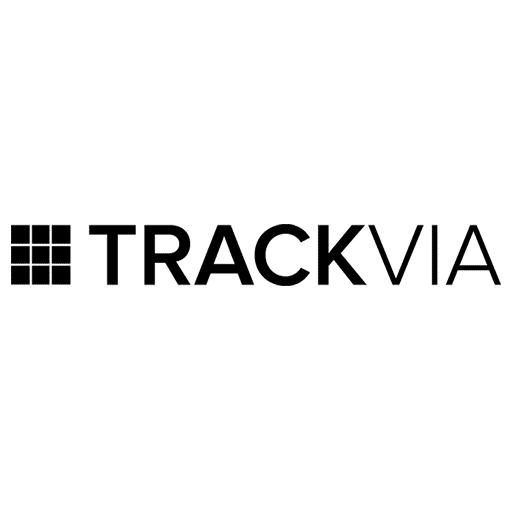



Summary
AI marketing offers numerous benefits for businesses, from improved customer segmentation to optimized campaign performance.
By following this guide and implementing AI-driven tools and strategies, you can maximize the potential of AI marketing and achieve better business results.
See how AI marketing services can help your business grow. Investing in skilling and professional growth for your employees will increase their understanding of AI technologies and their ability to contribute to your organization’s success.
Choose training programs by Matrix Marketing Group, tailored to employee roles, technical expertise, and organizational needs for maximum benefit. By utilizing marketing tools and strategies, you can maximize the potential of AI marketing solutions and drive better results for your business.
Analyze customer data and segmentation to create customized campaigns that are more likely to be successful. Marketing tools can identify patterns and trends in customers’ behavior and preferences to inform decision-making about which content to use in each campaign. This helps you communicate more effectively with the right audiences and increase engagement.
AI tools can also automate tasks such as creating personalized emails, optimizing content for different devices, and tracking campaign performance.
Use this automation to free up valuable time on more complex tasks or pursue other opportunities. Matrix Marketing Group utilizes the AI marketing canvas to initiate an AI-driven marketing strategy.
Utilize predictive analytics to identify potential customers or target audience segments that are more likely to convert. Marketing tools can help you better understand customer segments and their needs, enabling you to craft more effective, tailored messages. This helps you generate more leads and conversions for your business. Ask us for AI marketing examples.
George Schidge is a highly skilled AI engineer with extensive experience in the field. He has worked on projects incorporating machine learning, deep learning, and natural language processing algorithms to create powerful software applications. With over 10 years of experience working on AI projects, George is well-equipped to help transform any existing project into something groundbreaking.
George has spent much of his career developing AI solutions for healthcare organizations, enabling them to understand patient data better and make more informed treatment decisions. He has also helped numerous government agencies keep up with rapidly changing technology by incorporating AI into their systems.
In addition to his technical expertise, George brings a spirit of innovation and enthusiasm to any project he works on. He’s not afraid to take risks and think outside the box when it comes to problem-solving and creating new solutions. As a result, he consistently delivers impressive results that exceed expectations and move the needle within his industry.
Frequently Asked Questions
What are the benefits of using AI for marketing?

Utilizing AI for marketing provides numerous advantages, including enhanced personalization of customer experiences, faster and more efficient customer service, and cost savings. By leveraging AI technology, businesses can collect vast amounts of data to accurately understand individual consumer behavior and preferences. This data can then create powerful, targeted campaigns that drive higher ROI.
How does Matrix Marketing Group help businesses with AI in marketing?

At Matrix Marketing Group, we offer comprehensive AI services to help your business succeed. Our team of experts will collaborate with yours to develop customized strategies tailored to your specific objectives. We are here to provide ongoing support and refinement for your AI strategies so that you can stay ahead of the competition in a quickly evolving marketing landscape.
Are there any risks associated with using AI for marketing?

As with all technology, certain risks are associated with utilizing AI for marketing purposes. These risks include data privacy and security concerns, algorithmic bias, and difficulties in interpreting results. That’s why working with experienced professionals who understand how to optimize AI strategies while minimizing risks is important. At Matrix Marketing Group, our team of experts is well-versed in these best practices and can help ensure a successful AI customer experience.
What does the AI marketing service from Matrix Marketing Group cost?

The cost of an AI marketing service package from Matrix Marketing Group will depend on the specific type and scope of services required. We offer packages that range from basic level plans to more advanced solutions. All packages are tailored to each client’s specific needs, so prices may vary significantly depending on individual requirements. The cost of an AI marketing package can range anywhere from $10,000 to $15,000 per month. Contact us today to discuss pricing and find the perfect package for your business!

